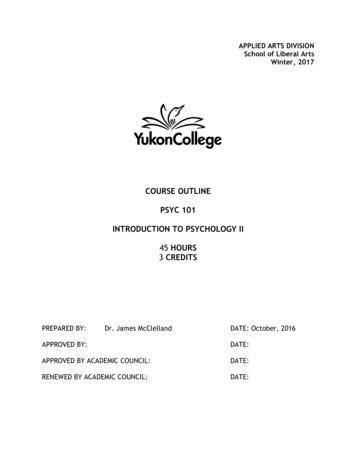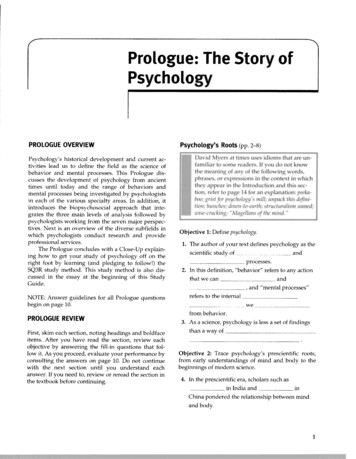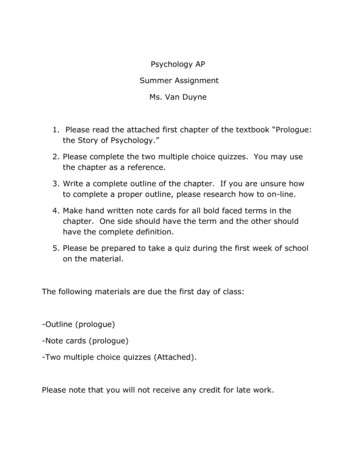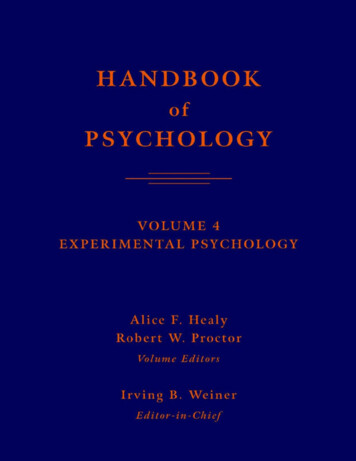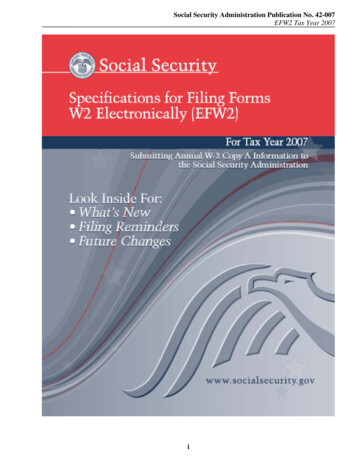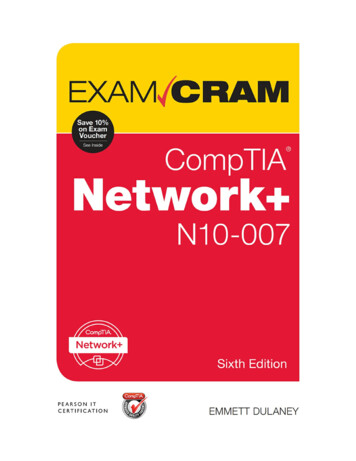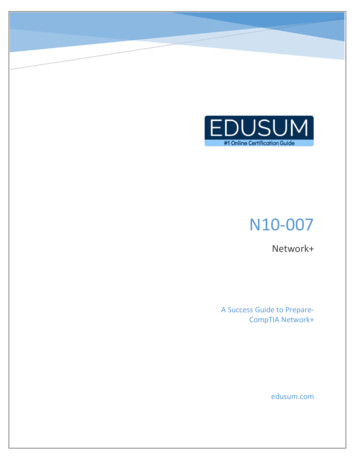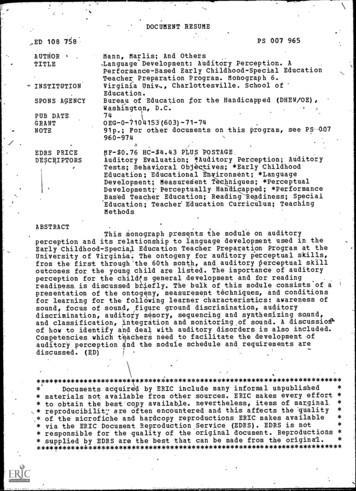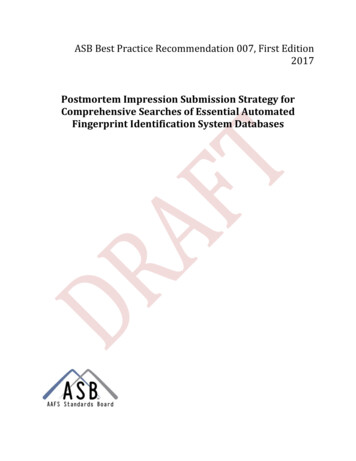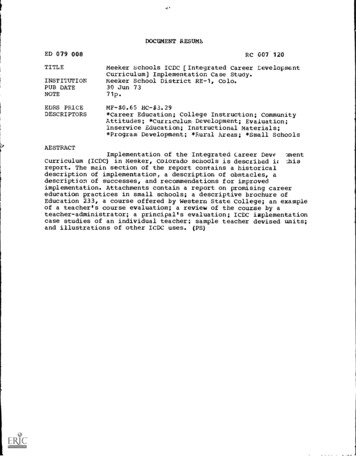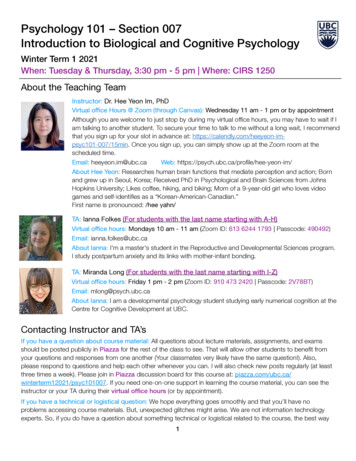
Transcription
Psychology 101 – Section 007Introduction to Biological and Cognitive PsychologyWinter Term 1 2021When: Tuesday & Thursday, 3:30 pm - 5 pm Where: CIRS 1250About the Teaching TeamInstructor: Dr. Hee Yeon Im, PhDVirtual office Hours @ Zoom (through Canvas): Wednesday 11 am - 1 pm or by appointmentAlthough you are welcome to just stop by during my virtual office hours, you may have to wait if Iam talking to another student. To secure your time to talk to me without a long wait, I recommendthat you sign up for your slot in advance at: https://calendly.com/heeyeon-impsyc101-007/15min. Once you sign up, you can simply show up at the Zoom room at thescheduled time.Email: heeyeon.im@ubc.caWeb: https://psych.ubc.ca/profile/hee-yeon-im/About Hee Yeon: Researches human brain functions that mediate perception and action; Bornand grew up in Seoul, Korea; Received PhD in Psychological and Brain Sciences from JohnsHopkins University; Likes coffee, hiking, and biking; Mom of a 9-year-old girl who loves videogames and self-identifies as a “Korean-American-Canadian.”First name is pronounced: /hee yahn/TA: Ianna Folkes (For students with the last name starting with A-H)Virtual office hours: Mondays 10 am - 11 am (Zoom ID: 613 6244 1793 Passcode: 490492)Email: ianna.folkes@ubc.caAbout Ianna: I'm a master's student in the Reproductive and Developmental Sciences program.I study postpartum anxiety and its links with mother-infant bonding.TA: Miranda Long (For students with the last name starting with I-Z)Virtual office hours: Friday 1 pm - 2 pm (Zoom ID: 910 473 2420 Passcode: 2V78BT)Email: mlong@psych.ubc.caAbout Ianna: I am a developmental psychology student studying early numerical cognition at theCentre for Cognitive Development at UBC.Contacting Instructor and TA’sIf you have a question about course material: All questions about lecture materials, assignments, and examsshould be posted publicly in Piazza for the rest of the class to see. That will allow other students to benefit fromyour questions and responses from one another (Your classmates very likely have the same question!). Also,please respond to questions and help each other whenever you can. I will also check new posts regularly (at leastthree times a week). Please join in Piazza discussion board for this course at: piazza.com/ubc.ca/winterterm12021/psyc101007. If you need one-on-one support in learning the course material, you can see theinstructor or your TA during their virtual office hours (or by appointment).If you have a technical or logistical question: We hope everything goes smoothly and that you’ll have noproblems accessing course materials. But, unexpected glitches might arise. We are not information technologyexperts. So, if you do have a question about something technical or logistical related to the course, the best way1
to get help is this: Post your question on the Other Course Questions board in Piazza so that everyone in theclass can see it. You’ll get help faster (and you’ll be helping any other student who may be facing the sametechnical/logistical issue). For technical issues on Canvas, you can also find help from experts by contacting theUBC Student IT Helpdesk. For any issues on LaunchPad, you should directly reach out the LaunchPadSupport team (not the UBC Student IT Helpdesk!).If you have an issue that is personal or specific to you: You can come to talk to one of us during our virtualoffice hours or use email to discuss it or arrange a time to talk individually with your instructor.Important Note: We are a big class of 370 students! To assist all of you better, we have assigned each of you toone of the TA's. If your last name starts with A to H, Ianna Folkes will be the first contact person. If your lastname starts with I to Z, Miranda Long will be the first contact person. So please make sure to email only theTA you are assigned to first, when you have questions or need any help (instead of contacting both at the sametime). This way, we hope that the TA's can use their time and effort more efficiently and help you promptly, withoutboth TA's having to deal with the same issue.General Course Description and Learning ObjectivesThis psychology course will introduce you to some of the major research areas within the field of psychology: thescientific study of the human mind and behaviour. This course will begin with an overview of psychology and itsresearch methods, and then covers several fundamental research topics in psychology (for example, how we seeand remember things, how we learn and think to solve problems or make decisions, how we communicate witheach other, and how our brain works behind the scene). By the end of this course, you should be able to:1. Describe the history and evolution of the field of psychology2. Describe the nature of scientific questions and research methods to study the human mind and behaviour.3. Describe major perspectives in modern psychology4. Identify how the brain produces and controls behaviour5. Understand major theories and research findings on sensation and perception, learning, memory,consciousness, language, and thinkingLearning Activities and Materials[1] Canvas: All lecture slides, recorded lectures, assignments, learning materials, and grades will be availablethrough UBC Canvas (www.canvas.ubc.ca). To access the course, you will need to log into Canvas with yourUBC CWL. Every Sunday night, I will post a new announcement to remind you of the learning activities requiredfor the week. I will also post an announcement (Announcements tab in Canvas) from time to time for importantcourse updates. Please check the Announcement tab frequently. Also, make sure your Canvas notificationsettings are turned on and arranged correctly so that you receive my messages, notes, and reminders forassignment dues. If you don’t know how to do this, please check this Step-by-step guide. Also, if you are notyet familiar with Canvas, make sure to read carefully this Student Guide to Canvas at UBC. Lecture slides willbe available in the Modules tab in Canvas by the evening before each lecture to facilitate your preparation andnote-taking.Please remember that the course is set to the Vancouver Time (Pacific Time, PT) zone, where the University ofBritish Columbia Vancouver Campus is located. All due dates will be set to Vancouver Time. Canvas will notautomatically change time zones for you, so make sure you have the correct time zone settings for your Canvas.If you want Canvas to display dates in your local time zone, you can go into your settings and adjust to yourpersonal local time zone. Here is the guide: How do I set a time zone in my user account as a student?[2] Textbook: Schacter, D.L., Gilbert, D.T., Nock, M., Johnsrude, I., & Wegner, D.M. (2020). Psychology:Fifth Canadian Edition. At a minimum, you must have access to LaunchPad, an online platform that contains2
an e-book version of the textbook, as well as online activities, quizzes, and resources. Older Canadian editionsand international editions are NOT suitable.** Special instructions for the textbook: Because all the course materials are integrated into Canvas, youMUST purchase your course materials (textbook, LaunchPad, or both) through the UBC Bookstore. Purchasesfrom any other retailer (e.g., Amazon, Discount Textbooks, etc.) are not able to be verified through the coursesite, and you will not be able to access the content needed. You have two options of purchasing the coursematerials:Option 1: Purchase either the physical or digital product in-store or online at the UBC Bookstore — for thesepurchases, you MUST keep your receipt in order to verify the purchase on the course site. If you purchase instore or online from the UBC Bookstore, you will need to log into the course site and click on the ‘Verify MyPurchase’ option in order to gain access to the online materials. You can find this option in the Canvas coursesite at Modules Macmillan Learning LaunchPad Load LaunchPad in a new window.Option 2: Log into the course site in Canvas and go to Modules Macmillan Learning LaunchPad LoadLaunchPad in a new window. There is a link to purchase the required materials (Click ‘See My PurchaseOptions’). Please note, you can only purchase the digital product if you choose this option.[3] Lectures: Live lecture sessions will be given every Tuesday and Thursday from 3:30 pm to 5:00 pm(Vancouver Time) at CIRS 1250 (Centre for Interactive Research on Sustainability; see the campus maphere). You can attend the lecture either in-person or online for live-streaming. More information for onlineparticipation through the live-streaming will be provided in Canvas. Whether in person or online, attending realtime lectures will be helpful for you to stay on track, without putting things off until the last minute (e.g., watchingall the lectures right before the exam). It is also a great opportunity to interact with the instructor and otherstudents, so it is highly recommended that you attend all the live lectures if possible. That said, attendance willbe optional and not be a part of your grade. If you can’t attend the live lectures online nor in person, you will beable to download the recorded lectures from the Modules tab in Canvas for later viewing.Please note that some of the material covered in lectures is not in the textbook, and some of the material in thetextbook will not be covered in lectures. For the exams, you are responsible for ALL material covered in lecturesand ALL material assigned from the textbook, including figures, definitions, boxes, activities, and summaries. Inthe textbook, we will cover Chapters 1 to 7 and Chapter 9 for this course (see Course Schedule on pages9-11 for more information).[4] LaunchPad LearningCurve Quizzes (7%): After reading the textbook, complete LearningCurve questionsassigned for each week on LaunchPad (All the links are available in Canvas). There is a target score forcompletion, so you may repeat taking the quizzes until you reach the target score each time. WeeklyLearningCurve quizzes need to be completed (i.e., achieve the target score) by every Sunday night of theweek, 10 pm (Vancouver Time). If you complete the quizzes later than the due date, you will only earn 50% ofthe assigned points for each. To learn how to use LearningCurve Quiz (and what it is), check this Tutorial forLearning Curve. You will get a full mark (1 point) for each LearningCurve Quiz for completion before thedeadline.[5] LaunchPad Activity Assignments (7%): Other LaunchPad activities, including Concept Practice,PsychSim6, and Data Visualization Activities are assigned to each week’s module as a requirement. All linkswill be available in Canvas. These activities will provide you with short (but very powerful) online tutorials or videoclips that help you better understand many concepts and terms of psychology. Just as LaunchPadLearningCurve Quizzes, all the assigned LaunchPad Activity Assignments need to be completed by everySunday night of the week, 10 pm (Vancouver Time). If you complete the weekly LaunchPad Activities after thedue date, you will only earn 50% of the assigned points for each. We strongly encourage you to complete“Quick Start Guide: LaunchPad” in Introduction Module (Canvas) during the first week of the course, to get3
yourself familiarized with the LaunchPad activities. You will get a full mark (1 point) for each LearningCurveActivity for completion before the deadline.[6] Three Exams (two midterms and one final; 28% each): There will be two midterm exams and one finalexam. NONE of the exams (including final) will be cumulative. Exams will take place online for this termthrough Canvas (Quizzes), considering all uncertainties regarding many health and safely issues during (the nextphase of) a global pandemic. All exams will be closed book. This means you CANNOT use notes, lectureslides, books, websites, chat rooms etc., to look up answers to exam questions.This course will use a combination of Zoom and LockDown Browser to monitor your exams. These tools werechosen in order to address accreditation requirements and maintain academic integrity for tracking academicprogress of individual students. LockDown Browser needs to be downloaded and installed by everyone beforethe exam to access the exam questions. This software is used to make sure the exam experience is as fair aspossible for everyone by locking down your main browser. For more information, please refer to the UBCLockdown Browser Student Guide. If you require accommodations for accessibility needs or technical/connectivity issues, please contact the Centre for Accessibility or your Enrollment Services Advisor. Becauseusing Zoom with Lockdown Browser is not recommended on ONE device due to recent technical issues, youwill need to use two devices, one for writing the Canvas exam with Lockdown Browser and a secondarydevice for Zoom that shows your workspace (i.e., writing the Canvas Quiz on a computer and have Zoom openon your phone, etc.). If you have a problem with using two devices for writing exams, email me as soon aspossible to find a solution. Please be aware that student activity captured by Canvas and Zoom during examscan be used to detect any instances of cheating. As the time approaches, we will provide a practice examsession so that you can install Lockdown Browser in advance and get familiar with it, before the actual exam(plus, completing the practice exam session will give you extra 2 points to your Midterm 1 score!). I will alsoprovide more instruction before the first midterm exam in a live lecture session.For each exam, there will be around 40 questions total. Each exam will include (a) Multiple-choice (one correctanswer), (b) Multiple-answer, (c) Multiple dropdown, and (d) Short-answer questions. You are expected touse the terminology introduced in this course in their short answers. Only minor deviations from correct spellingwill be accepted in most cases. Exam time will be for 80 minutes, following a 10-minute pre-exam session duringwhich you read and sign on the Integrity Pledge and double check your Lockdown Browser and Zoomsettings.The midterm exams will be held during our regular class times (Midterm 1: October 5 (Tuesday) at 3:30-5 pmand Midterm 2: November 2 (Tuesday) at 3:30-5 pm, Vancouver Time). It is the University policy that examstake place during the class time for midterms and during the assigned time for finals. Everyone is expected tolog into Canvas to take the exams during this exam time: No make-up exams will be provided in any case.The date and time for the final exam will be scheduled by the University during the formal exam period(December 11-22, Vancouver Time). Please note that supplemental exams to improve your grade are notoffered in any course in the Faculty of Arts. Cheating on exams will result in a score of 0 for that exam and will bereported to the University.Marks will be posted on Grades tab in Canvas as soon as they are available. You can review your exam for oneweek after the grades are released, but correct answers will not be viewable by students. You can discuss yourmarked exams with me and your TA during virtual contact hours (or by appointment). We will provide moreinformation on reviewing exams in a live lecture session.Missing Exams: If you are aware of scheduled UBC-sanctioned sport, travel, or a religious obligation thatconflicts with the date of an exam, you must contact the instructor within the first two weeks of classes so thatalternate arrangements can be made. It is your responsibility to coordinate with the instructor on a suitableconcession within one week of the original exam date (unless your circumstance warrants a longer period). If youmiss an exam for any other reason, you will receive a “0” on the exam. Please carefully assess your ability to4
attend the exams prior to the drop deadlines (check the Course Drop/Withdrawal Dates at e deadlines).We can’t provide you with an alternative exam date because the exams will be online. If you miss one of themidterms for one of the reasons that can be absolutely justified (e.g., medical emergency, etc.), the weight ofyour grade for the missed exam will be evenly assigned to two other exams. For example, say you are seriouslyill and cannot take the Midterm 1 (28%). Then both your Midterm 2 and final exam will be re-weighted to be 42%(28% 14%) for each exam you take. If you miss Midterm 2 (28%), both your Midterm 1 and final exam will be reweighted to be 42% for each exam you take. We can’t do such re-weighting for a missed final exam. If you can’ttake the final exam, you will have to take the necessary steps for Academic Concessions following the Universitypolicy. Read this Instruction for Academic Concession from the Faculty of Arts to understand what to dowhen you have to miss the final exam.Center for Accessibility: UBC is committed to equal opportunity in education for all students, including thosewith documented physical disabilities or learning disabilities. If you have a disability that affects your learning orperformance on tests or exams, please visit http://students.ubc.ca/about/access and take the necessary stepsto ensure your success at UBC as soon as possible. Exams for students receiving accommodation will beinvigilated by Centre for Accessibility staff.[7] Research Experience Component (REC): Psychology is an active and exciting scientific discipline. As part ofthis course, you will be asked to participate in the current research studies as a way of introducing you, in a morehands-on and interactive way, to cutting-edge psychology research. This REC will be worth 2% of your grade inthe class, and you are free to choose one of two options:[Option 1] Participate in the Psychology Department Human Subjects Pool (HSP): Most students willchoose to earn their research experience component by spending two hours participating in psychologystudies (i.e., participating in a study for one hour will give you each 1%) through the Department ofPsychology’s HSP system. You can locate, create an account, and sign up for studies by going to: https://ubc-psych.sona-systems.com/. Please register in the system by the end of the first month of classes to havethe opportunity to earn your first ½ hour credit with a brief online survey that will increase your eligibility for morestudies. Once registered in the system, you will be able to browse through and select which studies you wish toparticipate in, sign up for an available time slot, and confirm your accumulated credits afterward. At the end ofthe last day of class for the term, the subject pool is closed. At that point, you will no longer be able to receivecredits. I strongly urge you to participate and earn your credits long before the last week of class. Furtherinstruction on how to use the HSP online system can be found at https://psych.ubc.ca/hsp. There, you will finda detailed guide about how to participate in the HSP, how-to videos, and a list of frequently asked questions. Allthe questions regarding the HSP credits should be directed to hspresearch@psych.ubc.ca, not us. We won’tbe able to have access to your HSP credits until the very end of the course, so you will need to contact themdirectly when you have any issues or questions.[Option 2] The Library Option: As an alternative to participation in psychology subject pool experiments, youmay complete a library-writing project. Such projects consist of reading and summarizing 1) the researchquestion, 2) the methods, and 3) the results (in written form) of a research article from the peer reviewed journalPsychological Science. You will receive one (1) research participation credit for each article summary(approximately 500 words in length) that meets the requirements specified in the section on the Library Option(see the HSP website). Your credit is assigned using the online system, so you must log on to the HSP system(http://hsp.psych.ubc.ca/) and create an account before submitting your article summaries. Please make sureto include your name, student number, course, section, instructor and email address on each summary.Summaries must be submitted no later than 10 days before the end of classes. You are to submit your articleand your summary to turnitin.com. If you don’t have a turnitin account already (from a previous course), you willneed to create a user account in Turnitin. For the library assignment the class ID is 31445496, class name is5
"HSP 2021-2022 (Fall Term 1)” and password is "Research". See www.turnitin.com, and click on the“Training” link at the top of the page for detailed instructions on how to submit papers to Turnitin. Any studentwho is suspected of plagiarism will, at a minimum, not be granted credit, and their course instructor will benotified. Further action may be taken at a departmental or university level. More information will be also availablein the HSP website.Extra Credit (optional): You may earn up to 3% extra credit that will be added to your final grade, byparticipating in more studies: These extra credit points can be earned by doing up to three additional hours ofstudy participation in the HSP (or summarizing another three additional journal articles for the library option).Again, please note that any inquiries about credits should be directed to HSP or the experimenters that youworked with, NOT the course instructor. The credits you earn can be recorded and tracked via the subject creditwebsite. If you do not correctly assign your credits to this course, you will NOT receive credit, so please makesure to assign credits correctly and check your recorded bonus points for this course before the online systemcloses at the end of the term. These points will be added to your final course grade, after any scaling that maybe required. You are to submit your article and your summary to turnitin.com. If you don’t have a Turnitinaccount already (from a previous course), you will need to create a user account in Turnitin. For the libraryassignment the class ID is 31445496, class name is "HSP 2021-2022 (Fall Term 1)” and password is"Research". See www.turnitin.com, and click on the “Training” link at the top of the page for detailedinstructions on how to submit papers to Turnitin. Any student who is suspected of plagiarism will, at a minimum,not be granted credit, and their course instructor will be notified. Further action may be taken at a departmentalor university level.[8] Piazza Discussion Board: Although we will offer in person live lectures for this term, many learning activitieswill still be done online. We will be using Piazza for class discussion and posting questions and answers. Thesystem is highly catered to getting you help fast and efficiently from classmates, the TA, and the instructor.Rather than emailing questions to the teaching team, I strongly encourage you to post your questions on Piazza(unless it is personal issue). Please respond to questions and help each other whenever you can. I will also checknew posts regularly (at least twice a week). Please find our class page at: https://piazza.com/class/kt37i6ieqan2v4. You can also find the piazza discussion board through the Canvas. As well as logisticalquestions, please post any course content-related questions, comments, or relevant links/materials that youwould like to share with other students to one of the Piazza discussion boards. From time to time I will postsome interesting topics worth discussing or sharing, and you are also strongly encouraged to do so!Whether you plan to participate in this course online or in person, please do your best to interact, support, andhelp one another by actively joining in discussions and attending live lectures. Please remember when yourespond to other students’ postings, always be kind and respectful. Refer to this guide on CommunicationOnline: Netiquette.Course Policies[1] Grading: In order to reduce grade inflation and maintain equity across multiple course sections, all psychologyclasses are required to comply with departmental norms regarding grade distributions. For the 2020-2021academic year, the average grade in a 100-level Psychology course is 72 for an exceptionally strong class, 70 foran average class, and 68 for a weak class, with a standard deviation of 14. Please note that these averagegrades have been raised by 5% relative to previous years to reflect the unique circumstances of this academicyear. Scaling may be used to comply with these norms; grades may be scaled up or down as necessary by theinstructor or Department at the end of the course. Grades are not official until they appear on a student’sacademic record. You will receive both a percent and a letter grade for this course.Letter gradeA AA-B BB-C -6355-5950-540-496
[2] Sharing course materials: We work hard to provide all the materials you need to succeed in this course. Inreturn, please respect our work. All exam questions and answers, lecture slides, video recordings, Canvasmodules, and any other materials provided to you by the teaching team or the textbook are to be used bystudents currently enrolled in PSYC101. All these materials for ths course are copyrighted. It is unacceptable toshare any of these materials beyonds our course (e.g., posting on file-sharing websites). It is unacceptable tocopy and paste sentences from the textbook into for-profit software for use in studying. It is also unacceptableto buy/sell/swap/share exam questions or answers on any platform. Please respect our intellectual property andfollow academic integrity.[3] Learning During (the next phase of) a Global Pandemic: We are striving to learn in the context of a globalpandemic. We’ve all been through a lot and have a lot of different thoughts/feelings/experiences affecting ourtime in this class. For most of us (myself included), this is the first time physically in a classroom since the initiallockdown in March 2020. Here are some key points for this class for this semester: Our number one goal this semester is to care for each other and stay safe. As Dr. Bonnie Henry famously saidearly in the pandemic, “Be calm, be kind, be safe.” At the time of preparing this syllabus, UBC is planning for areturn to on-campus teaching this Fall. The preparations for resuming on-campus activities have been complexand fast-moving since August. Bear in mind that provincial and/or UBC guidance may change in the comingweeks, and some decisions have been take to allow maximum flexibility for the months ahead. I will announceany revisions to this document via Canvas. As a class, we have a duty of care to protect each other, our families,and communities. Complete a daily self-assessment for COVID-19 symptoms here: https://bc.thrive.health/covid19/en. This class has been designed to provide flexibility so that you can prioritize your health and stillsucceed in this course. The Campus Return Plan is available at https://covid19.ubc.ca/campus-return-plan/and student FAQs at https://covid19.ubc.ca/information-for-students/ Stay home if you feel sick, think you might have been in contact with someone with Covid-19, etc. Activeparticipation and engagement is an important part of doing well in this course, but you will not be graded for inclass attendance. Moreover, we will provide the live-streaming option for watching the lecture during in-classtime as well as recorded lecture for later viewing. So, while I encourage you to attend class when you are well, Ido not want you to attend class if you are sick under any circumstances. You can catch up later. As such, if youcome to class and have clear symptoms of illness, I will ask you to leave for the safety of everyone else in theclass unless you have talked to me before (e.g., if you have seasonal allergies and have already received anegative covid test). You are required to wear a mask. Besides vaccines and social distancing, one of our most effective protectionsagainst covid-19 is to wear a mask and to have others wear them too. I don’t like them (except occasionally asfashion statements) but I will wear one. You will too. If I see that you are not wearing a mask or wearing itimproperly, I will ask you to correct that situation and offer you a mask if you do not have one. If you do not havea properly fitted mask on your face after that (over both your nose and mouth), you will be asked to leave. Theremay be students who have medical accommodations for not wearing a mask- if so they should contact theCentre for Accessibility to determine the accomodations that will support them; these accomodations shouldthen be communicated to the instructor. Please refrain from eating or drinking in the in person sessions, and ifyou must drink please wear your mask in between sips. Please maintain a respectful environment. This is an evolving and uncertain situation. As your professor, I have gotten (late/contradictory/incorrect)guidance on how to keep us all safe in this moment and basically no information about what will happen next. Ihave designed this course to be flexible and to accommodate a variety of scenarios both now and in the future.These include students having to miss class for sickness or quarantining, to having to move the class fully onlinefor a period of time. I ask that we all make sure to be compassionate, flexible and helpful to each other duringthis period.7
Please see https://keeplearning.ubc.ca/ for strategies for setting up and learning effectively in our currentcontext, and reach out if you need extra support or accommodation. This syllabus and our course outline is just our current plan and they may have to change. This is always true butit is particularly true this semester. We will get through this. I am excited for this class with you all. Let’s make the most of it and particularly of ourprecious time together and stay as safe
and ALL material assigned from the textbook, including figures, definitions, boxes, activities, and summaries. In the textbook, we will cover Chapters 1 to 7 and Chapter 9 for this course (see Course Schedule on pages 9-11 for more information). [4] LaunchPad LearningCurve Quizzes (7%): After reading the
